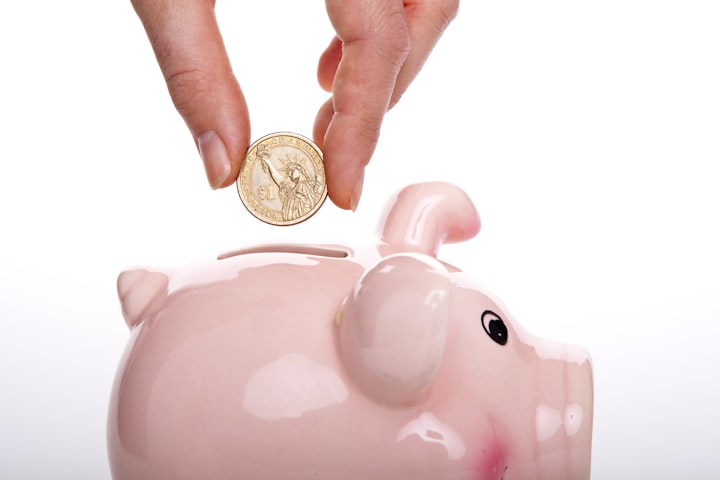4 Key Takeaways from the best selling book - The Psychology of Money
Lessons for personal finance

There are countless finance articles or books available on How to invest or Where to Invest. Technically, Investing sounds like one of the easiest things you can do. Just stay invested for the long term and hurray! You are rich! Especially during a bull run, you see a 15 per cent profit on your investments in a month or the best-case scenario, let's say you double your investments. You might end up thinking that you are the next Warren Buffet or Charlie Munger.
Up to now, while everything was going well, news breaks out that rattles the market - Rising tensions in the middle east lead to a war that in turn leads to an oil crisis. You look at your portfolio, and your investments are now down by 20 per cent. Your image of being the wolf of Wall Street shatters. You begin to doubt your intellect and investment decisions. You lose your sleep, and eventually like every other person you will pull out your investments and book a loss. Or, in the worst-case scenario, you invest another tranche to average it out. And guess what, the market tanks by another 10 per cent and the loss in your portfolio is unimaginable.
Now that is where investment philosophy and psychology comes into the picture.
After a recommendation from a close friend, I bought this book called The Psychology of Money. It's not an investment guide. As I mentioned, there is countless material available on this subject. But this book explores the philosophy around it. It clearly explains the difference between making money and generating wealth. Not only that, the author gives a perspective around human emotions and money.
These are my 4 Key Takeaways from this book

Respect your Luck
It was the fag end of the summer of 2015. By the end of my junior year pursuing Masters in Finance, I was smitten by the trading bug. Instead of focusing on the lecture, I was busy tracking the Index and tracking hot stocks. I made a profit of 400 bucks on my first day of day trading. After consistently making tiny profits over the next three months. I thought I had mastered the art of trading stocks. It was time to leverage. My broker gave me an option to trade with five times the money I had in my trading account. I roughly had savings of around 10k and leveraged four times i.e. 40k. I took my bet on a hot banking stock, thinking that I would square off my position by the end of the day after booking a hefty profit. On the same day, the Sensex recorded its biggest single-day crash of 6% and I lost 7k. I decided to close my trading account and have never traded to date.
"Success is a lousy teacher. It seduces smart people into thinking that they can't lose."
Bill Gates
My mistake was not just about leveraging excessively; it was also about ignoring the luck factor when I made some small profits. In mathematical terms, luck could be defined as an extremely low probability event. How often can one replicate a low probability event?
We have stories of CEO's running down the company to the ground after a decade of hitting the bottom-line targets. Were they not hardworking or smart enough? The media usually highlights the extreme events and tries to uncover the factors behind the success. It may not always be hard work or intelligence.

You don't have to be right all the time
Korean pop-star named Psy released a song called 'Gangnam Style' in 2012. The song blew up on the internet and has garnered more than 4 billion views on youtube making Psy a so-called overnight success. The views themselves translate into millions of dollars of advertisement revenues apart from the ticket sales of his concerts. After 9 years, it is still one of the most watched videos on Youtube. But, how many people knew that he made his first album in 2001? Not a lot of people would even know the songs he released post his Gangnam style success. For your reference, you can check his youtube channel. The song Gangnam Style is the only most watched videos on his channel apart from songs that fared average.
"It's not whether right or wrong that's important. But how much money you make when you are right and how much you lose when you are wrong."
George Soros
The same goes for investing as well. You cannot judge your portfolio on an individual stock basis. You need to look at the performance of your entire portfolio and move on. You will always have outliers that will pull up the portfolio performance, few will be average and most will be duds.
Production houses have been using this principle for a long. A studio such as Warner Bros. still generates a billion-dollar revenue each year from one of the most popular series FRIENDS. Netflix is getting odds in their favour by producing more projects compared to their peers. With every Money- Heist there are many failed shows on the platform. Netflix can afford to lose money on other shows by offsetting with a hit show like The House of Cards that has been their cash cow.
More than 55% of the revenue for Apple Inc. comes from the iPhone. If we apply similar logic to investments, you can be right only once and still make a fortune by getting more out of the tail. You can afford to lose money on some investments as the tail in your portfolio outshines everything else.

Being Rich vs being Wealthy
Why would you care to earn a lot of money? To buy fancy cars? To have the most expensive watch collection? As the author says, you can feel rich just by buying expensive stuff. But wealth is something that is invisible.
The most important thing that one needs to understand is that no one cares about where you party or the brand of your car. Also, the perception of someone being wealthy because of a luxury car is a myth! They might have spent an enormous chunk of savings on the down payment and paying the rest in hefty instalments out of their salary.
Being wealthy is not about showing people how much money you have or indulging in fancy activities. It is about gaining control over your life and avoiding vulnerable situations caused due to lack of resources. You are delaying your purchase for today, so that, you can gain more freedom and flexibility and buy more later.
You can build wealth with less income if you spend less than what you earn; or you can go broke if you spend beyond your capacity, no matter how much money you earn. Anything spent beyond comfort and convenience is nothing but just to boost your ego. Mike Tyson earned more than $300 million throughout his career in the 90s and by 2003, he declared bankruptcy. He admitted to splurging money on expensive mansions, cars and prostitutes. We have had countless stories of movie stars who went on a house-buying spree, and later they had to sell those houses to settle their debts. Hence, never judge the book by its cover.
"Was it really necessary to tell her that if you spend money on things, you will end up with things and not the money?"
Rihanna's financial advisor when she sued him after going bankrupt
A question that might arise in your mind is that what's the point in earning if you can't spend it. Again, here the author has emphasized on the wealth that is invisible, an extra car or an extra condo that could have been bought. We don't get to see their savings or investments as that part is always hidden.

Margin of Safety
You cannot reach anywhere without taking any risk. In a bull market, everyone's a winner. Let's say you have a 90 per cent chance of making money and a 10 per cent probability of losing money. But, if the cost of the 10 per cent downside is losing all the money, then the chance is not worth taking. As I mentioned in the first point, I lost money when I leveraged. I conveniently ignored any room for error because of my past success. The cost I had to pay was by losing 70 per cent of the principal amount. For many of you who are reading, 7k rupees might be a small amount but that's a lot of money for a college student. FYI, I intended to use it for food and commute over the next 2 months.
"The most important part of every plan is planning on your plan not going according to the plan."
Morgan Housel
Factoring in the cost of losing is one of the most important aspects of investing because the market can seduce you to take more and more risk during a bull run. Although, taking risk is an essential part of the process, but the risk that can wipe you out completely is not worth taking.
"When forced to choose…..I will not trade even a night's sleep for the chance of extra profits."
Warren Buffet
Although, the book explores various other aspects of creating wealth. These are the four key takeaways that I feel that one must keep in mind while investing in the markets.
If you liked the article and wish to read the book, you can use my Amazon affiliate link below to buy, as it will serve me as a token of support. It will also motivate me to work on more of such interesting articles.
https://amzn.to/3hop0Ae
About the Creator
Vaibhav Bhosle
Hi,
I am Vaibhav, a Finance guy by profession; intend to share my learnings with the world






Comments
There are no comments for this story
Be the first to respond and start the conversation.